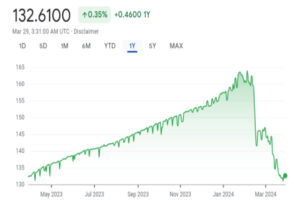Never in the history of mankind has financial security been so elusive. Out of a population of about 329.5 million people, 42 million US citizens rely on government food stamps for survival. Zimbabweans lost their hard-earned savings, pensions and businesses to a worthless currency during president Robert Mugabe’s regime. Ukrainians are currently painfully witnessing the destruction of their hard-earned wealth by war.
Citizens of Afghanistan, Bosnia, DR. Congo, Iraq, Libya, Sierra, Leone South Sudan, Somalia, and Syria have also painfully witnessed the destruction of their wealth by war in our lifetime. At the moment, Europeans are pensively following the progress of the Russia – Ukraine war.
Many countries in the world and especially in Africa have strongmen as presidents. In such countries, the definition of the constitution and the president are interchangeable and your financial security and prosperity are directly correlated to your political inclination.
In many countries, greedy and self-serving politicians and policymakers orchestrate mega corruption scams to massively enrich themselves and their cronies at the expense of the entire nation. Such countries’ economies often collapse and the private wealth of citizens that sometimes takes generations to build gets destroyed.
Argentinians, Russians, Venezuelans, and many African countries have in the past endured their fair share of economic disasters. At the time of this writing, Lebanon’s economy is approaching total collapse. The Lebanese pound has lost 90% of its value in two years. More than 74% of the Lebanese population has just slid into poverty.
Sri Lanka is also following the same script. It has defaulted on its foreign debts, inflation is at an all-time high at 30%, the country is experiencing crippling 12-hour power cuts, and there is an extreme scarcity of food, fuel, and other essential items such as medicines. Destruction of private wealth in Sri Lanka is underway.
You Are On Your Own
Billions of people are suffering financial insecurity for reasons that are not of their own making. Self-serving politicians, overbearing and incompetent governments, the battle for resources, the battle for global supremacy, and a myriad of other intrigues are to blame.
The hopeless citizen is always the one who picks up the tab. But there is a way out. Peace, political stability, and economic stability are the basic requirements for financial security. If conditions in your home country cannot guarantee your financial security, you are free to look for financial security in other countries where peace, political and economic stability seem to exist for eternity.
More good news is that you don’t have to migrate if, otherwise, home is sweet home. You just need to tweak your financial plan a little bit and move some of your financial investments to another country.
African communities have for long practiced keeping some of their livestock with relatives or friends living far away in distant lands. The simple reason was that if some disease wiped out most or all of their livestock or a rival community raided them for their livestock, the community would fall back on the livestock kept with relatives and friends in distant lands for sustenance. Different versions of this tribal wisdom were widely practiced all over the world by our ancestors.
The modern world is demarcated into countries and many people live urban lives. Everything is highly commercial and internet driven. The smartphone is now the main source of information and the free wisdom inherent in the culture of a people is hard to come by.
Tremendous scientific development in medicine relegated endemic livestock diseases to the chapters of history but war persists. The biggest threat to financial security for billions of people now comes from governments and the politicians who run them.
What Is Offshore Investing?
Offshore investing simply refers to investing money outside your country of residence. Financial investments can indeed be made in any country of the world that has the necessary infrastructure and laws that permit foreign investment.
Offshore countries are those countries that have distinguished themselves as Offshore Financial Centers (OFCs). These countries have investor-friendly tax, privacy, and investor protection laws that attract international investors who do not enjoy the benefit of such laws in their home countries.
Such countries, therefore, have a higher proportion of nonresident financial transactions. A simple way to understand the role these countries play is to visualize them as giant export processing zones for financial services.
Originally, offshore countries were located offshore but many onshore countries like Switzerland, UAE, and Luxembourg recognized what a gold mine OFCs were and transformed themselves into OFCs. Countries that have made such a transformation are now also referred to as offshore countries regardless of where they are located.
It’s Perfectly Legal
The term ‘offshore investment’ is used when international investments are routed through an offshore country. This investment strategy is as perfectly legal as it sounds but to be sure, it is prudent to look at what your home country’s tax law says about foreign income otherwise the taxman may request a date that you will not look forward to.
Offshore investing does not raise legal or tax issues for international investors who are not taxed on their worldwide income by their home countries but it is complicated for investors who are taxed on their worldwide income by their home countries.
The US frequently uses its powerful military and influential foreign policy to create business opportunities for US enterprises all over the world. It is therefore logical for the US government to demand taxes on the worldwide income of U.S. citizens.
A few other countries with similar tendencies to the US also require their citizens to pay taxes on their worldwide income. Offshore investing is complicated for citizens of such countries. Fortunately, most countries do not require citizens to pay taxes on income that is earned outside their jurisdiction. Offshore investing does not, therefore, pose legal or tax issues for the majority of international investors.
Typical offshore countries are tiny sovereign islands in the middle of the ocean with a population of just thousands of people and no significant natural resources besides fish but enjoy some of the highest living standards in this world. These countries have done a remarkable job in moving from such rudimentary economics into world-class financial centers.
Offshore Countries Are Smart
Offshore countries get right what many onshore countries get wrong every time. Most offshore countries do not participate or take sides in the politics or disputes in other countries or between countries or get entangled in alliances. Most don’t maintain an army and are often protectorates or dependencies of some other big country.
These characteristics are the main catalysts for peace, political stability, and economic stability in offshore countries. The oldest parliaments of this world, which are hundreds of years old, are found in offshore countries.
The real winner of course has to do with taxes. Offshore countries charge very little to no income tax. This is because politicians in offshore countries have no incentive to build massive infrastructure projects or raid other countries for their natural resources. The entire country is only a few hundred kilometers squared and the requirements of such a country are quite modest.
On the other hand, income tax in onshore countries is often north of 30%. This level of taxation is not comparable to the level of taxation in offshore countries. Financial institutions that want to do business with citizens of the world never miss taking advantage of this offshore opportunity. They incorporate offshore and enjoy huge tax savings. This is why offshore countries are also called tax havens.
Onshore countries on the other hand are several thousand kilometers squared with bulging populations that require every kind of government assistance and protection from both internal and external aggression. Politicians from these countries are in a rat race to outdo their predecessor’s legacies or outdo the next country’s infrastructure or emulate the most prosperous country by building the biggest infrastructure and the strongest army regionally or globally.
These endeavors always result in high income taxes that very easily find their way into politicians’ pockets. Contracts for infrastructure projects are routinely awarded to politicians’ cronies and families who return the favor through hefty kickbacks and campaign contributions. Infrastructure that gets delivered is often of poor quality or several times the real cost or both.
Some countries do well with the taxes they collect from citizens and are prosperous. The motivation to invest offshore for citizens of such countries is the opportunity to invest in the economies of countries that are growing faster than their own country.
Low taxation costs allow offshore financial institutions to reduce their overall cost of doing business. Some of this benefit is in turn passed on to clients in the way of lower costs of financial services products. This is the reason why offshore financial services products fair better cost-wise when compared to their onshore counterparts.
You might be wondering what benefit is in this arrangement for offshore countries. Well, they make big business out of financial regulation. Offshore financial regulation is refined to world-class standards and is without the political and nationalist overtones or sometimes mischievously ignorant undertones that are rife in onshore financial regulation.
Global financial institutions flock to small offshore countries to domicile their global operations for tax efficiency reasons and offshore countries reap big from financial regulatory fees and other fringe benefits. Offshore financial services also provide booming business for related legal, accounting, and real estate support services. This arrangement generates a lot of employment for residents of offshore countries.
Be the Smart One
Clients of offshore financial institutions on the other hand can rest assured knowing that their financial investments are in a safe jurisdiction beyond the reach of a hostile, incompetent, or unstable government at home. Some more good news is that many offshore countries go out of their way to generously guarantee financial investments entrusted to financial institutions within their jurisdiction just in case these institutions go under.
A common misconception about offshore investing is that offshore investments are done within offshore countries. This is contrary to the reality on the ground. Offshore financial institutions provide investment platforms that allow their clients to invest in any country in the world that has the necessary infrastructure and laws that permit foreign investments.
There is a minimum criterion so don’t expect to find financial investments from Somalia and other countries in similar circumstances on offshore investment platforms. Financial investments that feature prominently on offshore investment platforms include those from emerging economies like Brazil, Russia, India, China, South Africa, Indonesia, Singapore, and Malaysia among others, and developed economies like Germany, Britain, the U.S, Canada, Australia, Norway, and Sweden among others.
All financial asset classes including bonds, commodities like precious metals, money market instruments, stocks, and real estate are available on offshore investment platforms. However, investors need to approach any financial investments from an informed position. This is easier said than done. School curriculum all over the world gives financial literacy a wide berth yet it is essential knowledge for anyone seeking financial security in this modern world.
Engineers, doctors, pilots, architects, pharmacists, teachers, scientists, lawyers, and many other professionals graduate without acquiring proficiency in personal finance yet they are expected to invest their income in stocks, bonds, precious metals, and other financial instruments for their financial security. It helps a great deal to have a competent financial adviser by your side if your background is not in finance.
Your diligence will also go a long way in ensuring success in your international investments. Make sure you have clear investment goals, confirm that the proposed investment is consistent with your goals and risk profile, read all the fine print before you sign on the dotted line and finally participate in the management of your investment by reviewing it regularly with your financial adviser.
That one requires large sums of money to make an offshore investment is a myth that needs to be busted. Regular investments can be as low as USD 150 payable monthly, quarterly, half-yearly, or yearly. Lump sum investments can be as low as USD 5,000, very affordable by many standards.
What is also nice about investing in these times when there is a lot of technological advancement is that you will have online access to your investment. An increasing number of offshore investment platforms allow viewing of valuation statements, re-balancing of portfolios, withdrawals, top-ups, and updating of account holders’ information to be done online.
Any good thing under the sun attracts mischief from human beings. Tax evaders and criminals have in the past used offshore countries to hide money from tax authorities and to launder proceeds of crime. This is why investing offshore sometimes looks tarnished.
Changes have since occurred and principal tax and law enforcement authorities frequently exchange information on suspicious transactions. Tax evaders and criminals should therefore beware. Offshore countries are no longer a sanctuary for dirty money.






